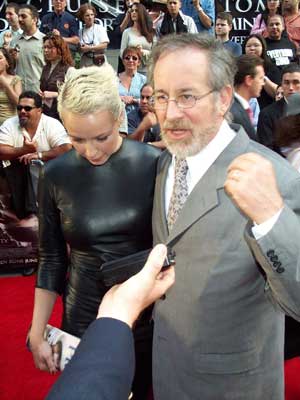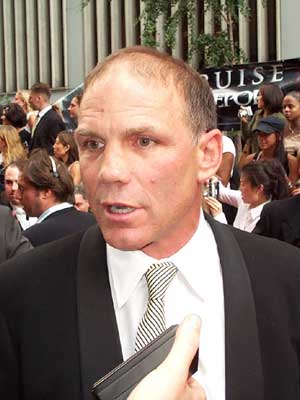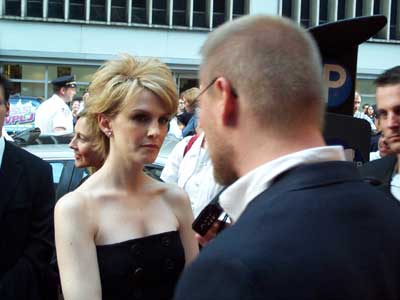Minority Report: A View from the Red Carpet
"Hi, Internet," Steven Spielberg says affably.
Standing on a red carpet next to Samantha Morton, who plays a prescient "Pre-Cog" in the director’s new film Minority Report, Spielberg waves to a row of photographers and reporters on the other side of a barricade bearing a row of dot-com notices. When I hold out my tape recorder, he takes a step toward us.
I ask him a question. He responds. I am talking to Steven Spielberg.

Hi, Internet: Steven Spielberg tells Decent Films he’s excited about the future. Photo: Dave Westra
What does he say? He talks about the future — how exciting it is, how tricky to predict or anticipate. He’s very gracious, but he seems almost not to trust his ideas — to prefer to let his movie do the talking for him. The future world of Minority Report reflects the visions of a think tank of futurists — yet their predictions, he points out, are already in the past. The future is a funny thing, he says. It occurs to me that there’s a strange resonance between the movie’s precogs foreseeing crimes before they happen and the behind-the-scenes futurists trying to divine the shape of the future.
I want to ask him a follow-up question about the theme of justice in the film, but by this point the director has been on the red carpet for the better part of an hour, working his way up to the Ziegfeld Theater. He seems to stop to talk to everyone, so his progress is slow, and I know I can’t delay him any longer. I thank him. He smiles and waves goodbye to the Internet.
Somewhere further back on the carpet is Tom Cruise, star of Minority Report. Penélope Cruz, who arrived with him, has long since brushed past press and fans and gone on ahead. On the other side of the carpet, Colin Ferrell (Hart’s War), who plays Cruise’s rival, signs autographs for the fans.
As Tom approaches, the Internet buzzes. Is he going to stop? A digital photographer reasons that if Steven stopped, Tom surely will — but a web-based reporter counters that Steven is nicer than Tom. Meanwhile, a red-carpet publicist promises to bring Tom over to us, even indicating the position on the carpet he will take.
Despite this, several minutes later Tom blows past the designated stopping point, ignoring the flashing cameras and extended tape recorders. The publicist turns and mouths a silent apology.

Patrick Kilpatrick tells Decent Films what’s wrong with a lot of future films. Photo: Dave Westra
But Tom’s costars are more accomodating, and their comments echo Spielberg’s enthusiasm for the future, as well as expressing a vague belief in some higher order or balance in the universe that obtains when even the best human systems of justice fail.
"I think the Force, or God, as you choose, is always going to be just," says Patrick Kilpatrick (The Replacement Killers), who plays an officer in the movie’s "precrime" unit. "The balance is going to reassert itself no matter what you think. I mean, all you have to do is go through a divorce, and you’ll understand…
There’s a church in LA called Agape which is a really cool church. I mean, I’ve been to a lot of churches, and this particular one has a really great message, a very positive one, and it shows that everybody is an expression of God — and I came out of the womb thinking that. So when I ran into this ideology, it just fit."
"Well, it’s almost like about faith, isn’t it?" muses Kathryn Morris (below), who plays Cruise’s estranged wife. "I believe, you know, that the universe, or God, or whatever is out there when we all die — that there’s a natural way, a natural progression of life and death, and tragedy… You know, there’s that yin and yang with everything.
"You know," she adds, "there’s fungus, and then there’s the tree — and they can’t live without each other. We don’t like the fungus… but they can’t live without each other."

Kathryn Morris talks to Decent Films about the universe, or God, or whatever is there when we die. Photo: Dave Westra
I don’t tell her that she’s half right — that, while the fungus can’t live without the tree, the tree can live just fine without the fungus — or that this one-way dependency, rather than the symbiotic relationship she meant to describe, actually is analogous to the relationship between evil and good.
"I’m very optimistic," she goes on. "I think we’re addressing possibilities in films like this, and just what’s going on in the world right now… I think we’re looking at exactly what the consequences would be, and what they wouldn’t be. I’m very hopeful."
Kilpatrick is also optimistic, and appreciates the potential of movies to explore the possibilities. "I think the one thing that’s wrong with a lot of future films is that they’re apocalyptic in nature. And I think life is always a balance, it’s always going to be ups and downs. I like to believe there are always possibilities.
"The best films, whether they’re Reservoir Dogs or
Braveheart…
always show us how to live. That’s what they need to do. Even
Related
Minority Report (2002)
Spielberg has always known how to manipulate an audience’s emotions, a knack he makes effective use of here. Humor alternates with squirming discomfort and emotional release as the director pokes fun of Cruise’s sex-symbol status in a couple of funny incidents, then leaves us wincing with a number of scenes involving eyeballs, or a character fumbling blindly for the one edible sandwich in a squalid refrigerator.
Recent
- Crisis of meaning, part 3: What lies beyond the Spider-Verse?
- Crisis of meaning, part 2: The lie at the end of the MCU multiverse
- Crisis of Meaning on Infinite Earths, part 1: The multiverse and superhero movies
- Two things I wish George Miller had done differently in Furiosa: A Mad Max Saga
- Furiosa tells the story of a world (almost) without hope
Home Video
Copyright © 2000– Steven D. Greydanus. All rights reserved.